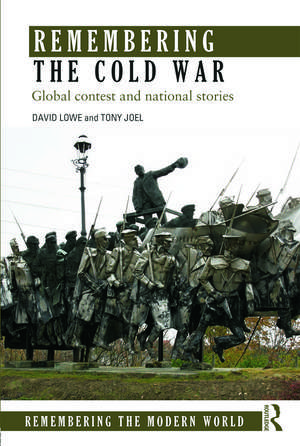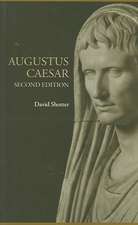Remembering the Cold War: Global Contest and National Stories: Remembering the Modern World
Autor David Lowe, Tony Joelen Limba Engleză Paperback – 19 dec 2013
Over five sections, this richly illustrated volume considers case studies of Cold War remembering from different parts of the world, and engages with growing theorisation in the field of memory studies, specifically in relation to war. David Lowe and Tony Joel afford careful consideration to agencies that identify with being ‘victims’ of the Cold War. In addition, the concept of arenas of articulation, which envelops the myriad spaces in which the remembering, commemorating, memorialising, and even revising of Cold War history takes place, is given prominence.
| Toate formatele și edițiile | Preț | Express |
|---|---|---|
| Paperback (1) | 367.83 lei 43-57 zile | |
| Taylor & Francis – 19 dec 2013 | 367.83 lei 43-57 zile | |
| Hardback (1) | 765.84 lei 43-57 zile | |
| Taylor & Francis – 12 dec 2013 | 765.84 lei 43-57 zile |
Preț: 367.83 lei
Nou
Puncte Express: 552
Preț estimativ în valută:
70.39€ • 73.67$ • 58.58£
70.39€ • 73.67$ • 58.58£
Carte tipărită la comandă
Livrare economică 31 martie-14 aprilie
Preluare comenzi: 021 569.72.76
Specificații
ISBN-13: 9780415661546
ISBN-10: 0415661544
Pagini: 280
Ilustrații: 2 black & white illustrations, 54 black & white halftones
Dimensiuni: 156 x 234 x 20 mm
Greutate: 0.41 kg
Ediția:New.
Editura: Taylor & Francis
Colecția Routledge
Seria Remembering the Modern World
Locul publicării:Oxford, United Kingdom
ISBN-10: 0415661544
Pagini: 280
Ilustrații: 2 black & white illustrations, 54 black & white halftones
Dimensiuni: 156 x 234 x 20 mm
Greutate: 0.41 kg
Ediția:New.
Editura: Taylor & Francis
Colecția Routledge
Seria Remembering the Modern World
Locul publicării:Oxford, United Kingdom
Public țintă
Postgraduate and UndergraduateCuprins
Introduction. 1. Conceptualizing Cold War Remembrance 2. Nuclear World 3. Cities and Sites 4. Defining Our Times 5. Endings
Recenzii
'Lowe and Joel’s thematic approach to remembrance of the Cold War provides an important, and hitherto overlooked, lens upon the epoch defining contest: seemingly ubiquitous, the differing national experiences of the Cold War are expertly considered.'
Dr J. Simon Rofe, SOAS, University of London
'Scholarship on historical memory of twentieth century wars and the holocaust have been highly fashionable in the past decade. Remembering the Cold War opens up a vast new field of investigation into the historical memories of the Cold War. The introductory chapter introduces the general reader to the vast theoretical literature on memory studies in easily comprehensible form. The Cold War was a global event and this innovative study covers sites of memory from Vietnam to Australia, from Berlin, Prague and Budapest to California. Numerous pictures taken by the authors of Cold War lieux de memoire add a stunning visual history to this fine text, opening up a fertile new field of study. This book is a must read.'
Dr Günter Bischof, University of New Orleans, USA
'Remembering the Cold War is an accessible and innovative exploration of the ways that this extraordinary era in world politics is evoked and recast in our contemporary moment. The book is unique in its approach to the Cold War as an object of our common memories. It is a timely and welcome contribution to the general field of Memory Studies.'
Andrew Oppenheimer, formerly of Maastricht University, The Netherlands
Dr J. Simon Rofe, SOAS, University of London
'Scholarship on historical memory of twentieth century wars and the holocaust have been highly fashionable in the past decade. Remembering the Cold War opens up a vast new field of investigation into the historical memories of the Cold War. The introductory chapter introduces the general reader to the vast theoretical literature on memory studies in easily comprehensible form. The Cold War was a global event and this innovative study covers sites of memory from Vietnam to Australia, from Berlin, Prague and Budapest to California. Numerous pictures taken by the authors of Cold War lieux de memoire add a stunning visual history to this fine text, opening up a fertile new field of study. This book is a must read.'
Dr Günter Bischof, University of New Orleans, USA
'Remembering the Cold War is an accessible and innovative exploration of the ways that this extraordinary era in world politics is evoked and recast in our contemporary moment. The book is unique in its approach to the Cold War as an object of our common memories. It is a timely and welcome contribution to the general field of Memory Studies.'
Andrew Oppenheimer, formerly of Maastricht University, The Netherlands
Descriere
Over five central chapters, Remembering the Cold War takes a series of events and case studies and examines the ways in which they are now ‘remembered’, from Hiroshima and nuclear-bunkers-turned-museums, through the sale of pieces of the Berlin Wall, to Hollywood films about spying. The volume engages with growing theorisation in the field of memory studies, specifically in relation to war. David Lowe and Tony Joel afford careful consideration to agencies that identify with being ‘victims’ of the Cold War. In addition the concept of arenas of articulation, which envelops the myriad spaces in which the remembering, commemorating, memorialising, and even revising of Cold War history takes place, is given prominence.

















